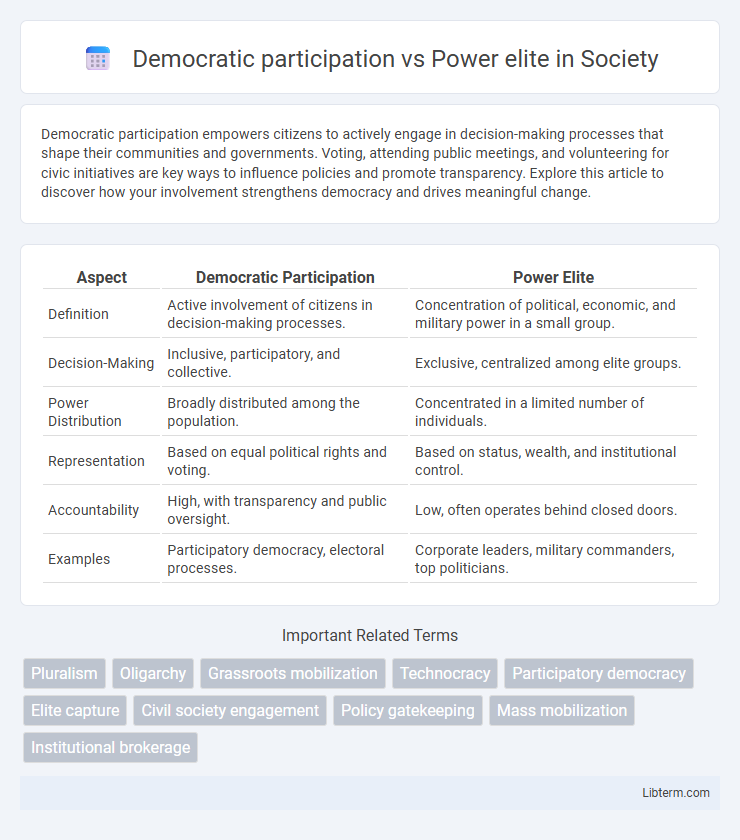Democratic participation empowers citizens to actively engage in decision-making processes that shape their communities and governments. Voting, attending public meetings, and volunteering for civic initiatives are key ways to influence policies and promote transparency. Explore this article to discover how your involvement strengthens democracy and drives meaningful change.
Table of Comparison
| Aspect | Democratic Participation | Power Elite |
|---|---|---|
| Definition | Active involvement of citizens in decision-making processes. | Concentration of political, economic, and military power in a small group. |
| Decision-Making | Inclusive, participatory, and collective. | Exclusive, centralized among elite groups. |
| Power Distribution | Broadly distributed among the population. | Concentrated in a limited number of individuals. |
| Representation | Based on equal political rights and voting. | Based on status, wealth, and institutional control. |
| Accountability | High, with transparency and public oversight. | Low, often operates behind closed doors. |
| Examples | Participatory democracy, electoral processes. | Corporate leaders, military commanders, top politicians. |
Introduction: Defining Democratic Participation and Power Elite
Democratic participation refers to the active involvement of citizens in political processes, including voting, advocacy, and public discourse, essential for ensuring representative governance. The power elite concept identifies a small, interconnected group of influential individuals or institutions that dominate key decision-making roles in politics, economics, and society. Understanding these definitions clarifies the tension between broad civic engagement and concentrated authority in shaping public policy and social outcomes.
Historical Origins of Democratic Participation
The historical origins of democratic participation trace back to ancient Athens, where direct citizen involvement in decision-making laid the foundation for modern democratic ideals. Over time, democratic participation evolved through the expansion of suffrage during the Enlightenment and the 19th-century revolutions, challenging the dominance of the power elite who traditionally controlled political and economic resources. This evolution highlights the ongoing tension between broad popular engagement and the concentration of power among an influential minority shaping policy and governance structures.
Emergence and Influence of the Power Elite
The emergence of the power elite is characterized by a small group of individuals occupying dominant positions across political, military, and corporate institutions, enabling concentrated control over decision-making processes. Their influence often undermines democratic participation by shaping policies and agendas that prioritize elite interests over public needs. This dynamic creates a disparity where democratic engagement is marginalized, limiting the effectiveness of citizen involvement in governance.
Comparing Theoretical Frameworks: Pluralism vs. Elitism
Democratic participation emphasizes broad involvement of diverse groups in decision-making, aligning with pluralism which asserts that power is distributed among multiple competing interest groups ensuring balance and representation. In contrast, the power elite theory, grounded in elitism, argues that a small, cohesive group of elites controls key decisions, limiting genuine democratic participation and concentrating authority. Theoretical frameworks contrast by portraying democracy either as an open arena of competing interests or as dominated by a unified elite with disproportionate influence.
Mechanisms of Democratic Participation in Modern Societies
Mechanisms of democratic participation in modern societies include voting, public deliberation, and civic activism, which enable citizens to influence policy decisions and hold leaders accountable. These democratic tools contrast sharply with the power elite model, where a small group of interconnected elites control economic, political, and military institutions, limiting broader public input. Enhancing transparency, inclusive electoral systems, and digital engagement platforms helps counterbalance elite dominance and promotes more equitable representation.
How Power Elites Shape Policy and Governance
Power elites, consisting of influential political leaders, corporate executives, and military officials, wield significant control over policy decisions and governance structures, often prioritizing their interests over broad democratic participation. Their ability to influence legislative agendas, shape public opinion through media ownership, and maintain close networks with key government institutions enables them to steer policies in ways that reinforce their power and economic advantages. This concentration of power limits the capacity of ordinary citizens to impact governance, thereby constraining democratic participation and undermining representative policymaking.
Barriers to Genuine Democratic Involvement
Barriers to genuine democratic involvement often stem from the concentration of influence in the hands of a power elite, which limits broad-based participation and consolidates decision-making among a small group of political, economic, and social leaders. Structural inequalities, such as unequal access to education, economic resources, and media platforms, restrict marginalized communities from fully engaging in democratic processes. These obstacles undermine the principles of representative democracy, perpetuating a cycle where elites maintain control while the majority faces exclusion from meaningful political power.
Media’s Role in Amplifying Elites or Promoting Participation
Media often amplifies the influence of power elites by disproportionately highlighting their voices and agendas, which can skew public perception and limit diverse democratic participation. Concentrated media ownership and editorial biases contribute to reinforcing elite dominance while marginalizing grassroots movements and minority perspectives. Promoting inclusive media platforms and encouraging critical consumption can help democratize information flow and enhance genuine citizen engagement in democratic processes.
Case Studies: Real-World Examples of Elite Power vs. Mass Participation
Case studies such as the Occupy Wall Street movement highlight the tension between mass democratic participation and the influence of power elites in shaping policy decisions. In the 2000 U.S. presidential election, the Supreme Court's ruling in Bush v. Gore exemplified elite power overriding popular electoral processes. Comparative analysis of South Africa's post-apartheid transition illustrates how inclusive participation can coexist with elite negotiation to facilitate democratic consolidation.
Strategies for Strengthening Democratic Institutions and Reducing Elite Dominance
Strengthening democratic institutions requires implementing measures such as transparent electoral systems, robust checks and balances, and inclusive policy-making processes that amplify marginalized voices. Strategies include promoting civic education, encouraging grassroots activism, and enforcing regulations limiting disproportionate financial influence in politics to reduce elite dominance. Enhancing accountability mechanisms through independent oversight bodies and fostering media pluralism also plays a critical role in balancing power distribution and supporting genuine democratic participation.
Democratic participation Infographic

 libterm.com
libterm.com